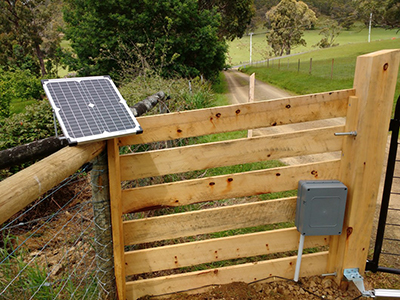Pros and cons of solar powered gate openers
Solar powered gate openers are rising in popularity because they have improved their reliability. That is why many consumers are seriously considering solar. However, not everyone might think that they are an ideal solution.
When it comes to solar powered gate openers, we always emphasise the following attributes to help the customer consider having one installed on their property.
What’s in it for you?
- Savings – You can now enjoy lower energy bills. Since the gate opener uses energy from the sun, it’s virtually free. Aside from the initial product cost and installation fees if not DIY, they won’t be spending more for the operation. Even in poor conditions, the battery in the unit will operate the gate for a number of openings and closings which has been charged from the solar panel.
- Installation – Solar power allows you to install a gate opener in a remote location or one that has limited access to a power. This also means that the labour that goes into the installation of the unit is reduced, as there is no need to dig 600mm into the ground in order to run 240volt cables to the gate or need an electrician.
- Safety – with solar power, access to the property is never an issue as the gate will not fail during power outages. This means that you will not have to leave your car while you open the gate and will never be left feeling vulnerable, especially late at night.
What do you need to know?
Each installation of a solar-powered gate operator should be assessed to ensure that they work correctly for the situation they are in and the application they are required for. Read the following list to be guided:
- The size of the solar panel and battery will depend on the number of operations per day and the amount of accessories (Eye beams, keypad) that may be fitted.
- Solar panels need to be mounted in a position where they will get the most sunlight and away from over shadowing trees or buildings.
Solar Pros
- Does not need 240 volt
- Works very well in sunny locations or limited duty applications
- Can still use other accessories
- No need to worry about power outages
Solar Cons
- Limited power availability results in limited duty cycles
- High duty cycles or power requirements may require larger batteries
- Power hampered even further by clouds or extensive night operation
Now with this knowledge, you know what benefits you can get and what limitations you can expect from a solar powered application.